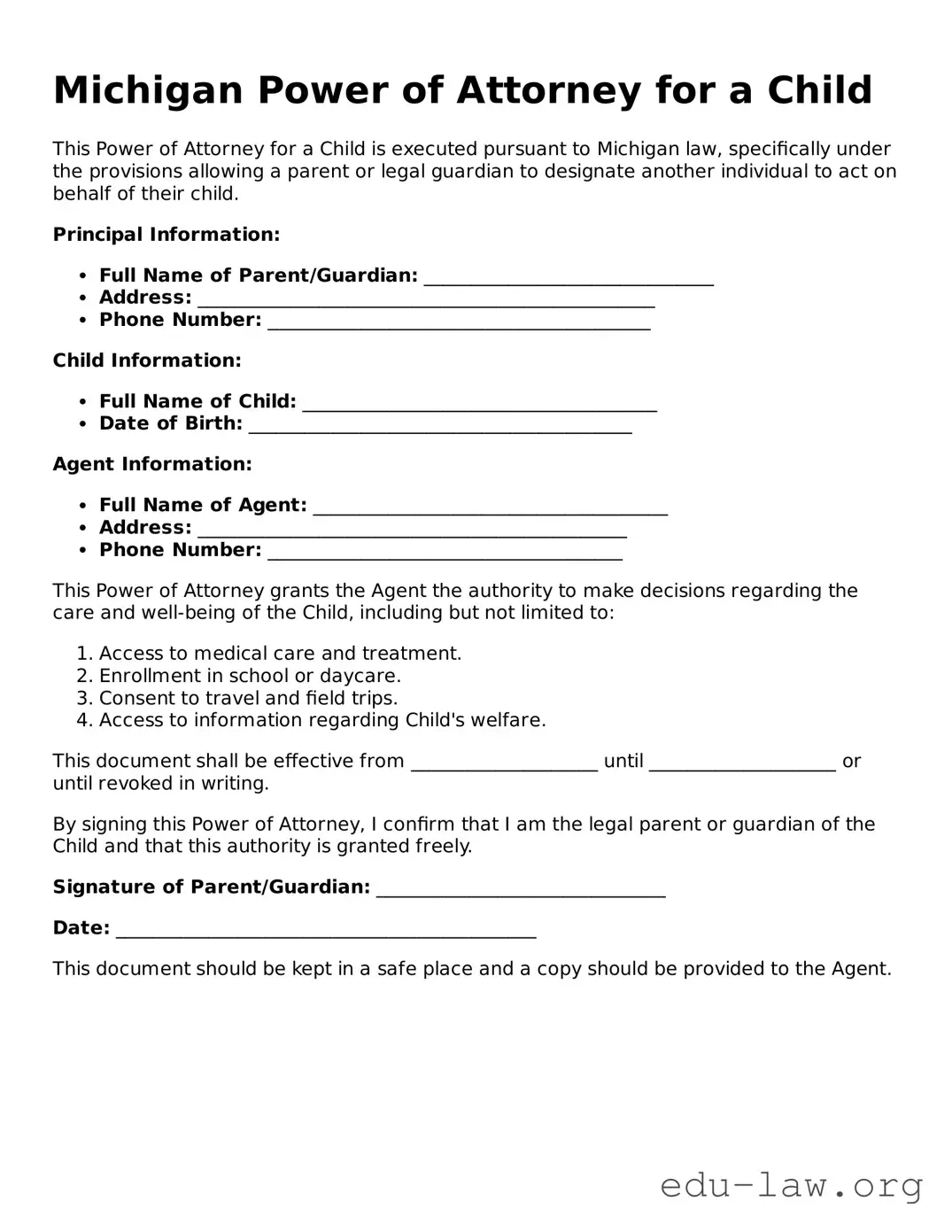What is a Power of Attorney for a Child in Michigan?
The Power of Attorney for a Child is a legal document that allows a parent or legal guardian to appoint another individual to make decisions on behalf of their child. This arrangement is often useful for temporary situations, such as when parents are traveling or unable to care for their child for a limited time.
Who can be appointed as the attorney-in-fact for my child?
In Michigan, the person you choose to act as the attorney-in-fact must be at least 18 years old and capable of making informed decisions regarding the child’s welfare. Common choices include family members, trusted friends, or even neighbors. It's important to select someone who has your child’s best interests at heart.
How long does the Power of Attorney for a Child last?
The duration of this power of attorney can vary based on your preferences. It can be set for a specific period or until a certain event occurs, such as your return from travel. However, keep in mind that it can be revoked at any time by the parent or guardian who created it, as long as that individual is still capable of doing so.
Is a Power of Attorney for a Child legally binding in Michigan?
Yes, it is legally binding if completed properly and signed according to Michigan law. The document should be dated and signed by the parent or guardian, and it is advisable to have it notarized to further affirm its validity. Notarization may not be required by law, but it helps in establishing the authenticity of the document.
Can the attorney-in-fact make medical decisions for my child?
Yes, the Power of Attorney for a Child can grant the attorney-in-fact the authority to make medical decisions. However, be specific in the document about the extent of these powers. Some parents choose to limit medical decisions to emergencies only, while others may want to allow broader authority for routine health care.
What happens to the Power of Attorney if I divorce?
A divorce does not automatically invalidate a Power of Attorney for a Child. The document remains in effect until you revoke it or until any specified time limit expires. However, it is wise to review and possibly update the Power of Attorney after a divorce to reflect your current wishes regarding who should make decisions for your child.
Can I revoke the Power of Attorney for a Child?
Yes, you can revoke it at any time as long as you are capable of making decisions. To do this, simply inform the attorney-in-fact in writing, and consider notifying any relevant parties, such as schools or doctors, who may have received the document. Creating a formal revocation letter can help ensure clarity.
Do I need a lawyer to create a Power of Attorney for a Child?
While it is not legally required to consult a lawyer to create a Power of Attorney for a Child in Michigan, having legal advice can be beneficial. A lawyer can ensure that the document meets all legal requirements and reflects your specific wishes, providing you with peace of mind.
Where can I obtain the Power of Attorney for a Child form?
Forms for the Power of Attorney for a Child can typically be obtained from local government websites, legal aid organizations, or online legal service providers. Ensure that you use the most recent version and that it complies with Michigan laws.
What should I do after creating the Power of Attorney?
After creating the document, it's important to provide copies to the attorney-in-fact and any institutions that may need it, such as schools or medical providers. Keep the original in a safe place and inform people involved in your child's life about who has the authority to make decisions on their behalf.
